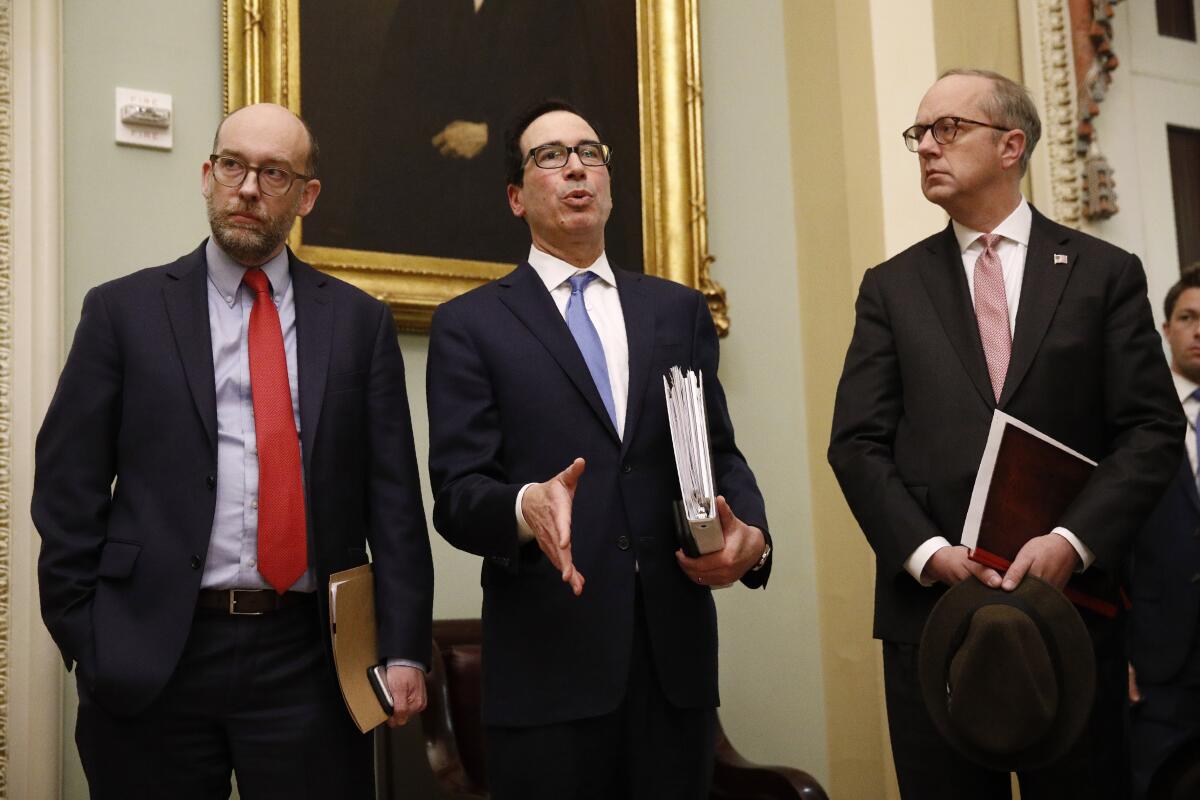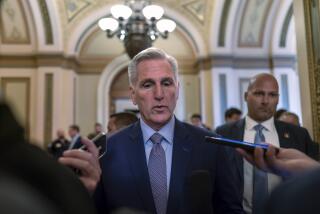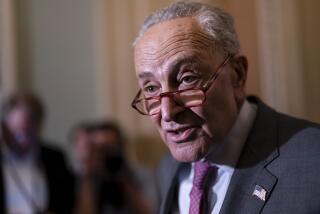Senate partisanship boils over as stimulus talks stall

- Share via
WASHINGTON — Senate Republicans and Democrats grew visibly angry and emotional on the Senate floor Monday as negotiations over a financial rescue package appeared to stall, even as Senate Minority Leader Charles E. Schumer (D-N.Y.) said he and Treasury Secretary Steven T. Mnuchin were close to a final agreement.
Senate Majority Leader Mitch McConnell (R-Ky.) bitterly accused Democrats of fiddling with politics by trying to add to the deal unrelated environmental policies. Schumer similarly blamed Republicans for issuing “partisan screeds” instead of engaging in serious negotiation.
In a sign of the fiercely partisan back and forth, Schumer briefly blocked Sen. Susan Collins (R-Maine) from speaking on the floor. Sen. Tom Cotton (R-Ark.) shouted, “This is bullshit.”
The toxic tone gave little hope of a quick resolution to the standoff over the latest coronavirus relief bill, despite pledges from congressional leaders that they would get aid to the public quickly. McConnell announced Monday evening that even if a deal were hatched, there would be no vote Monday.
That partisanship surpassed that seen during President Trump’s impeachment trial and rivaled the temperature seen in the days of the 2018 confirmation of Supreme Court Justice Brett M. Kavanaugh. And it comes after years of what lawmakers call a complete breakdown in bipartisanship.
“This country was founded by geniuses, but it’s being run by a bunch of idiots,” said Sen. John Kennedy (R-La.).
The tension in the Senate — where one senator and one Senate spouse tested positive and four other Senate Republicans were in quarantine — matched the fear and emotion circulating throughout the U.S., said Sen. Richard J. Durbin (D-Ill.).
“It’s no surprise that that is reflected on the floor of the Senate,” he said.
President Trump, for his part, chastised the partisanship in the Senate and said Democrats should approve the bill Republicans wrote.
“Congress must... join together to pass the Senate bill as written and avoid playing any more partisan games,” he said. Democrats “have to stop asking for things that have no relationship to what we’re talking about”
On Sunday afternoon, Senate Democrats blocked an effort to advance the measure they said was drafted solely by Republicans, forcing Mnuchin to turn to Schumer for support from his Democrats. McConnell called up the same vote on Monday afternoon and it failed, 49-46.
Since the Sunday vote, Mnuchin and Schumer have been frequently huddling in the Democratic leader’s office or speaking by phone. Schumer has essentially sidelined McConnell from the negotiations, telling the Senate that he would keep lawmakers informed on the status of negotiations.
Lawmakers spent the weekend in Washington negotiating the rescue package, which is expected to come close to $2 trillion. It would provide direct payments to individuals and families — as of Sunday it was estimated to average about $3,000 for a family of four, Mnuchin said. It would also expand unemployment benefits, provide a massive loan program to tide over small businesses and offer support to large corporations.
It would be by far the largest such measure in U.S. history, equivalent to roughly half the current federal budget.
Republicans and Democrats differed over the scope of a fund to help large businesses. Democrats said the fund had too few requirements on the businesses that would get help — such as a ban on stock buybacks — and that Republicans had not provided enough transparency on which companies would get it.
Schumer said since he and Mnuchin began talking, the funding for hospitals, including personal protective equipment for healthcare workers, “has gone up dramatically” from the $75 billion the GOP provided, a key concern of Democrats. He also said they’re “making progress” on providing new funding for state and local government and hopes to extend unemployment benefits beyond the three months provided by Republicans.
“This bill is going to affect this country and the lives of Americans, not just for the next few days, but in the next few months and years — so we have to make sure it is good,” Schumer said Sunday after a late-night meeting with Mnuchin and Eric Ueland, the White House’s chief liaison to Congress.
Republicans blasted Democrats for trying to tack unrelated policies onto the bill. McConnell said Democrats were holding up the bill in order to add tax credits for solar energy and new emission standards for airlines.
“Are you kidding me?” McConnell said on the Senate floor. “This is the moment to debate new regulations that have nothing whatsoever to do with this crisis?”
Democrats confirmed that they made the proposals, but only in response to unrelated Republican proposals that they did not reveal. Democrats, meanwhile, are pushing back on language in the bill that would exclude nonprofits that receive Medicaid funding from receiving the new small business assistance. The exclusion would leave out Planned Parenthood, but also home health agencies, group homes for people with disabilities and community health centers.
“The last thing anyone should be doing in the middle of a public health crisis is restricting access to healthcare providers that women, people with disabilities, people with substance abuse disorders and more trust and rely on,” said Sen. Patty Murray (D-Wash). “There’s absolutely no justification for this — it’s exactly the kind of partisan, harmful politics we frankly don’t have time for right now.”
Former Vice President and Democratic presidential hopeful Joe Biden echoed Senate Democrats in a video. He blasted the corporate fund and called for the bill to include forgiveness of student loans and a pause on evictions, among other policies favored by Senate Democrats.
“The Trump administration could allow money for stock buybacks, for executive pay,” he said in criticizing the corporate fund. Families, Biden said, “shouldn’t have to pay for a corporate handout before they get the help they need.”
On the other side of the Capitol, House Democrats introduced their own $2.5 trillion, 1,432-page bill. House Speaker Nancy Pelosi (D-San Francisco) has been working with Schumer on the Democrats’ negotiation, but as those talks have dragged on, she has introduced her own plan.
“We urge the Senate to move closer to the values in the Take Responsibility for Workers and Families Act,” Pelosi said. “We must be bold and forward looking in our thinking. We must be swift and evidence based in our actions. And we must be prayerful.”
The bill would provide $150 billion for hospitals and community health centers, requires healthcare facilities to implement infectious disease protocols and provide protective equipment for health workers. It would also eliminate patient cost-sharing for coronavirus treatment, give Americans a direct cash payment, enhance unemployment compensation and further expand paid leave.
Meanwhile, the coronavirus leapt into the Senate over the weekend. Sen. Rand Paul (R-Ky.) said Sunday that he tested positive for the virus, sending himself into quarantine. Two other Republican senators said they would quarantine because of their contact with Paul. With two other Republicans already in quarantine, it brought the total number of quarantined senators to five.
Sen. Amy Klobuchar (D-Minn.) announced Monday that her husband was hospitalized with COVID-19. Klobuchar said she had been apart from her husband since he had symptoms and thus didn’t need a test.
Paul’s decision to seek out a test despite not having symptoms — and his decision not to quarantine as he awaited the results — sparked frustration and even outrage among his fellow senators. Even as Americans have been urged to stay indoors, Paul sat next to other senators during a GOP lunch and worked out in the Capitol gym after receiving his test.
Paul, who had a portion of his lung removed last year, said Monday that the existing guidelines around testing are insufficient. If he had followed them, he would have never gotten a test because he doesn’t have symptoms and would continue to unknowingly spread the virus.
“It was my extra precaution, out of concern for my damaged lung, that led me to get tested,” he said. “Perhaps it is too much to ask that we simply have compassion for our fellow Americans who are sick or fearful of becoming so. Thousands of people want testing. Many, like David Newman of ‘The Walking Dead,’ are sick with flu symptoms and are being denied testing. This makes no sense.”
Times staff writers Chris Megerian and Sarah D. Wire contributed to this report.
More to Read
Get the L.A. Times Politics newsletter
Deeply reported insights into legislation, politics and policy from Sacramento, Washington and beyond. In your inbox three times per week.
You may occasionally receive promotional content from the Los Angeles Times.











